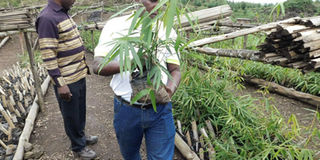Soil mining, tree cutting threaten Echuya Forest

Intervention. Nature Uganda officials at the bamboo nursery bed in Muko, Rubanda District, last week. The local NGO has identified 5,500 households in the area to pilot bamboo planting. PHOTO BY ROBERT MUHEREZA
What you need to know:
- Claims. Some people from Rwanda have been illegally entering Uganda through Bufundi Sub-county to dig up loam soil from the forest.
- “Cutting down bamboo trees and digging up of loam soils from Echuya Forest Reserve does not only affect the wild animals that live in this beautiful environment but also denies government foreign exchange from tourists that normally come to see the wild animals that stay in here,’’ Achilles Byaruhanga, executive director Nature Uganda
RUBANDA. Echuya Forest Reserve that stretches to Rubanda and Kisoro districts on the Uganda and Rwanda border is being degraded by the surrounding communities.
People suspected to be coming from the neigbouring Rwanda, dig up loam soil in the 3,400-hectare forest reserve and take it to their gardens so as to get high crop yields. This, coupled with illegal harvesting of bamboo trees, and other activities are threatening the ecosystem in the forest reserve, which is a popular tourist destination.
The forest is habitat for about 10 monkey and baboon species, more than 300 bird species, including the world’s highly endangered bird, the Grauers Rush Warbler.
The tourists travelling to Mgahinga and Bwindi National Park for the Mountain Gorilla tracking also do bird watching in the forest.
Conservationists and local leaders in Rubanda District are now decrying increased destruction of the Echuya Forest Reserve.
The Rubanda District chairperson, Mr Kenneth Jogo Biryabarema, says for about six months, people from Rwanda have been illegally entering Uganda through Bufundi Sub-county, to dig up loam soil from the forest and take it to their gardens leaving the trenches that endanger lives of wild animals.
He says the district council recently passed a resolution asking the police to arrange for day and night patrols so that the culprits can be arrested. The degradation has continued despite the surveillance.
“We are planning to hold cross border meetings with our counterparts in Rwanda to design mechanisms of how this illegal activity that is degrading our environment can be stopped. We hear that the Rwandans take the loam soil from the forest to use it in their gardens as manure for better yields,” Mr Biryabarema says.
He asked residents to arrest any foreigners found taking the soils from the forest and hand them to the police.
However, the coordinator for people partner at Nature Uganda, a local non-governmental organisation, Ms Zeneb Musiimire, says the Rwandans, who cross into Uganda to take the soil are hostile.
She says they recently assaulted and injured a group of Ugandans that attempted to arrest them.
Not aware
Rwanda High Commissioner to Uganda Frank Mugambage in a telephone interview last week, said Uganda and Rwanda leaders in the area should use the cross border meetings to address the matter.
“I am not aware of this illegal activity but the Ugandan leaders in the affected areas should engage their Rwanda counterparts during their cross border meetings and resolve the matter locally,” he said.
According to the area LCII chairperson, Mr Willy Rwomushana, the Rwandans enter through Kashasha Parish and carry the soil in sacks.
He says they also cut and carry bamboo for domestic and commercial uses.
“Local leaders in the area have formed a surveillance group, Kashasha leaders forum, to protect the forest reserve. Howvere, this has not been very successful because it seems the foreigners have changed tactics as they sneak into the country at night,” says Mr Rwomushana.
The executive director for Nature Uganda, Mr Achilles Byaruhanga, said they have been largely successful in mobilising Ugandans to conserve the forest despite challenges.
“By the time Nature Uganda came in to preach the gospel of conserving Echuya Forest Reserve and its rare animal and tree species in 1990s, the biggest percentage of the forest reserve was degraded into dairy farms and crop gardens. We formed collaborative forest management groups in the communities around the forest and empowered them with skills to protect and conserve the forest,” Mr Byaruhanga says.
“We supported them in modernising agriculture on their pieces of land and offered them tree seedlings to plant to reduce pressure on the forest. It disheartens to hear that the foreigners are the ones now degrading our conserved forest resource. I appeal to leaders to take charge and ensure that foreigners are stopped from degrading the forest reserve,” he says.
Mr Byaruhanga says recent research on the forest reserve shows that the bamboo trees that form 50 per cent of tree vegetation are reducing due to increased demand for bamboo. They are, among others, used in making toothpicks and handicrafts.
With support from the National Forestry Authority (NFA), Nature Uganda recently planted bamboo seedlings on seven hectares of land in the forest.
The NGO has also established bamboo nursery beds in Muko Sub-county, Rubanda District, and seedlings will be distributed to 5,500 households on the forest boundary as a way of domesticating it so that local people use it any time they want it instead of putting pressure on the reserve.
“Cutting down bamboo trees and digging up of loam soils from Echuya Forest Reserve does not only affect the wild animals that live in this beautiful environment but also denies government foreign exchange from tourists t,” says Mr Byaruhanga.
Support
The NFA supervisor for Echuya, Mr Herbert Turyahabwa, appeals to local leaders to support forestry authority to stop the degradation.




